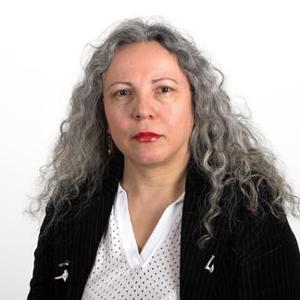An international network
“Hello from India, Brazil, Japan… and Hudiksvall!” Around 30 researchers, and others working in practical applications, participated on Thursday in a digital workshop on research and innovation during the coronacrisis. Those who had taken the initiative were Solmaz Filiz Karabag, innovation researcher and associate professor, and Petter Krus, professor of fluid and mechatronic systems in the Department of Management and Engineering.
Solmaz Filiz Karabag.
The idea arose when the LiU researchers, from two completely different divisions, bumped into each other in the A Building, a few days before distance mode was activated at LiU. They had colleagues all over the world who were already, or who soon would be, working from home.
“It was a problem that also became an opportunity. When everyone must be at home, the geographical barriers disappear, and everyone is equally isolated, no matter where they are physically. This also makes it easy to set up an event like this”, says Petter Krus.
Brazil and Hudiksvall
Others involved in organising the event were Luciana Pereira, researcher at the Federal University of ABC in Brazil, and Paul Bogatir, coordinator for Hudiksvall’s Hydraulics Cluster, HHK. Both already have an established collaboration with LiU.
The aim of the workshop was to obtain a global perspective on the coronacrisis with different perspectives from different parts of the world. Several participants emphasised the rapid reconfiguration necessary, with respect to organisation, production and services. Two examples: Trains have been refurbished in India to become rolling hospitals. Military manufacture of bullet-proof vests in Brazil has been converted into the production of protective equipment against the coronavirus. The Brazilian armed forces no longer talk about the “enemy”, but on “abilities” – what it can contribute in various areas.
Our behaviour may also be changing. One participant described how the level of activity is noticeably higher in digital meetings, where all participants contribute and say something. In physical meetings, it’s usual for some people to sit quiet, while others talk more.
Compelled to change
Important questions for the future are which of all these changes will be permanent, and which ones should be? Most people seem to agree that digitalisation and innovation have received a powerful impetus, and that there is a huge need for flexibility and learning.
Petter Krus calls the coronacrisis the largest disruption in society since the Second World War.
Some of the participants during the seminar.
“It has compelled us to act more flexibly and to use new abilities, and this will certainly be useful after the crisis. For example, we have never arranged a workshop such as this one so rapidly”, he says.
“Both the academic world and the commercial world are changing and becoming bolder, quite simply because they must. The coronacrisis is a new situation for everybody, and nobody knows what is right or wrong”, Paul Bogatir adds.
Further workshops
The initiative-takers are already planning a second workshop. They also have long-term plans for a more permanent network and possibly also an international knowledge platform: “Knowledge society without borders”.
“We are very pleased with how the workshop went. We learnt a lot, not least how people in other countries are finding new ways to act in the crisis. We discussed how we can act in the future to meet similar challenges”, says Solmaz Filiz Karabag.
“On a purely practical level, we also learnt a lot about the technology and how to hold a workshop like this. We put a lot of conscious thought into how to increase engagement among the participants.”
The name “Phoenix” arose during the planning of the workshop. It comes from the myth of the phoenix, a magical bird that is consumed by fire, from the ashes of which a new phoenix arises.
Translated by George Farrants
• The programme of the workshop: Phoenix Program

